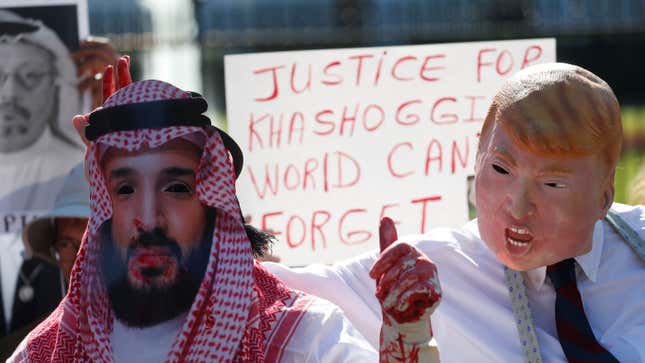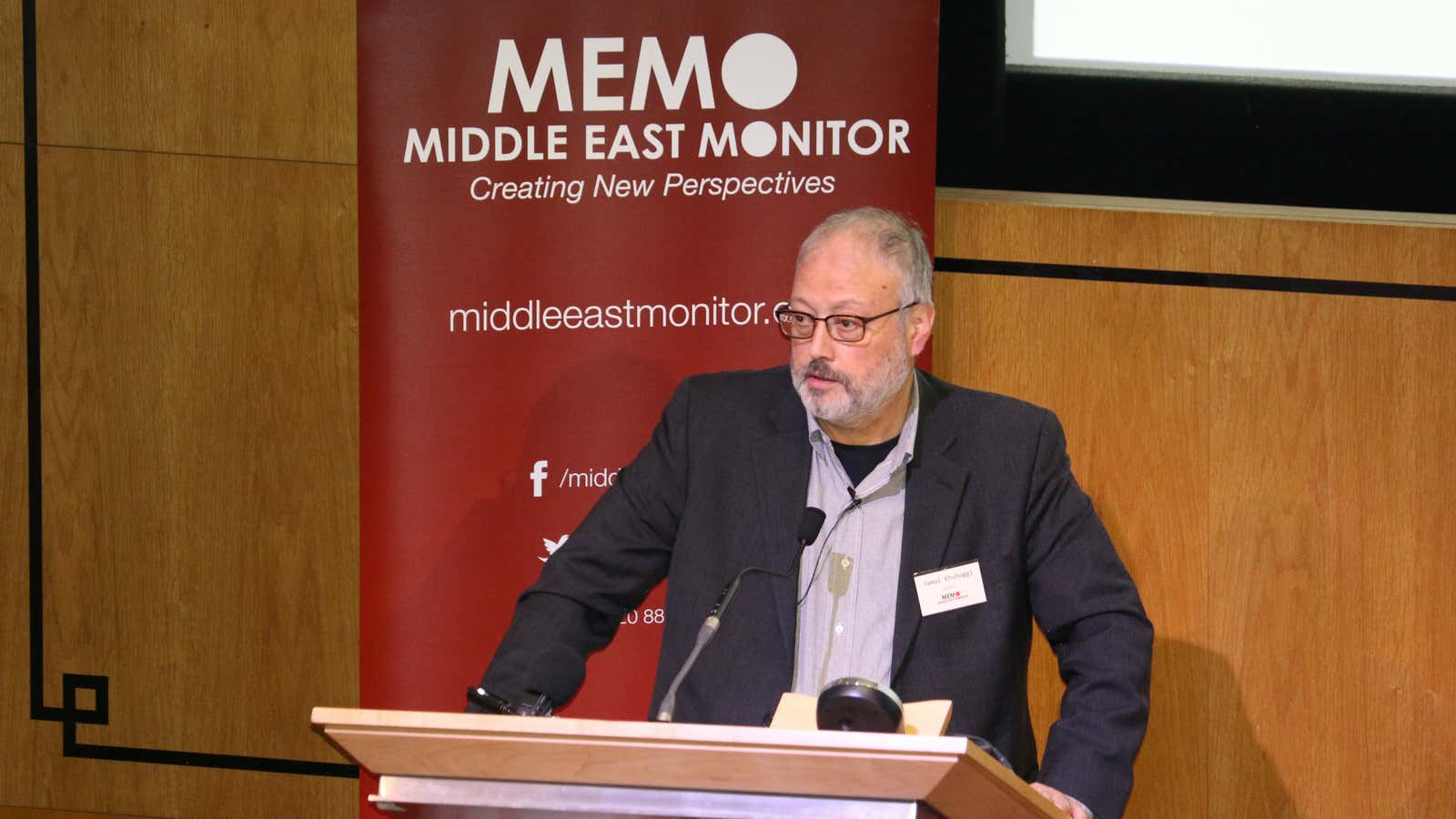The death of Jamal Khashoggi, the Saudi dissident and journalist killed inside the kingdom’s consulate in Istanbul, has sparked worldwide outrage. But will that translate to lasting impact on Saudi’s relationship with the rest of the world?
Max Fisher, writing in the New York Times, called this the “greatest point of crisis” in US-Saudi relations in many years and “a kind of tipping point.” In the Washington Post, columnist David Ignatius was even more assertive: “The kingdom’s relationship with the United States, and its access to global financial markets, hangs in the balance.”
Despite the outcry, there’s good evidence to suggest that this current “crisis” will become little more than a blip. If any action is taken by the international community or the US, it is likely to be symbolic and short-lived—and Saudi human-rights abuses will continue to be unimpeded.
A look at the history of the region shows that even very high-profile cases have had a limited effect on how willing US politicians are to sanction Saudi Arabia:
Allies who agree to disagree
James Gelvin, a history professor at UCLA and author of The Modern Middle East: A History, says that the relationship between the US and Saudi Arabia will be under scrutiny only as long as Khashoggi’s death stays in the news. “What’s going to happen is that the administration is going to get a lot of pressure,” he says. Congress will likely impose minor sanctions and Donald Trump could veto them. Congress could then respond by overriding that veto, Gelvin says. In return, “the Saudis will do something symbolic,” such as withdrawing their diplomats from the US. Then, the news cycle will move along, and things will quietly go back to how they were before. “After a while, the thing will blow over.”
That’s if anything happens at all: Ahead of the midterm elections, both both house of Congress are out until mid-November.
In fact, Saudi Arabia and the US have often had cause to agree to disagree, with little lasting hurt to the relationship. “It’s not as if they’re on the same page about everything,” Gelvin says, citing the US position on Jerusalem and the 1973 OPEC oil embargo as past sticking points. On the whole, the US turns a blind eye to such difficult topics as Saudi’s many imprisoned dissidents or its role in the brutal Yemeni civil war. (The kingdom is ranked 149th out of 159 countries by the Cato Institute for personal, civil and economic freedom and human rights.)
The details of Khashoggi’s death have made it harder to overlook. He was an English-speaking Washington Post journalist whose story has been well-reported. It is easily accessible and relatable to western audiences in ways that the circumstances of many other Saudi activists are not. What’s more, Khashoggi’s death has been seen as an attack on free speech and the freedom of the press, taking the story directly to what Gelvin calls “the heart of American values.” Yet that still doesn’t necessarily mean that it will have a lasting impact.
Historically, the US overlooked Saudi misconduct in large part because of American reliance on Saudi oil. (That’s no longer such a large consideration.) Now, other geopolitical concerns tie the countries together. Gelvin cites three in particular: the weapons deals introduced under the Obama administration, the Saudi role in mediating the Israeli-Palestinian conflict, and US attempts to isolate Iran within the region and perhaps impose regime change in Tehran.
Those concerns prevent Trump from rocking the boat. Trump laid out his position on the Khashoggi case last week: “I don’t like the concept of stopping an investment of $110 billion into the United States. You know what they are going to do? They’re going to take that money and spend it in Russia or China or someplace else. I think there are other ways.” For Trump, one journalist’s death pales in comparison to the amount of money coming in.
Still, as Vox reports, that $110-billion “deal” isn’t actually signed. Most of what was put forward was negotiated under the previous administration: documents that are largely letters of intent and interest, rather than actual contracts. As of earlier this month, according to CNN, Saudi Arabia has come through with only $14.5 billion in purchases. The corresponding number of jobs, which Trump has estimated as being between 500,000 and a million, is likely to also be much, much smaller. And Saudi Arabia has also dragged its feet on Israeli-Palestinian peace negotiations, Gelvin says, while convincing Trump that terrorism in Iran is a greater regional problem than the Yemeni civil war or climate change.

The history of “tipping points”
The assassination of Archduke Franz Ferdinand is often cited as an example of how an individual event can precipitate huge change. (It is often said to have triggered Austria-Hungary’s declaration of war against Serbia, which in turn led to the First World War.) But the vast majority of these so-called “tipping points” change very little other than public perception. Even then, that focus tends to be short-lived. Internationally, even high-profile cases with particularly emotional appeal, such as the 2015 death of Aylan Kurdi, the Syrian refugee child who drowned before he and his family could reach Greece, or the 2017 Parkland school shooting in Florida, have failed to trigger substantive political change.
When it comes to Saudi Arabia, it’s harder to identify many stories that have had as much of an impact on public opinion as Khashoggi’s death. American politicians and media outlets alike tend not to focus on its history of human rights abuses: The country’s role in the war in Yemen, in which millions are on the verge of starvation, has triggered barely a ripple in the American public consciousness, despite accusations of war crimes by the UN. Even the restrictions the country places on its female citizens have barely affected its international reputation. Minor steps forward such as giving women the right to drive were lauded in American media, even while it remains legal to stone women to death for adultery. Women cannot travel without a male guardian, interact with men they are not related to, or wear what they choose.
A case for the history books
Khashoggi was a high-profile journalist with close ties to the Western press. His death may well prove historic—but that doesn’t mean the response to it will be. For those unfamiliar with the region, it’s revealed troubling information about how power structures in Saudi Arabia work. People following it more closely, however, say it’s unsurprising. Either way, this probably won’t be the event that tangibly changes the rest of the world’s tolerance for Saudi human-rights violations: If politicians do act, it’s likely to be short-lived and symbolic, such as withdrawing from the kingdom’s investment conference.
As far as the US is concerned, imposing real economic pressure that would actively harm the relationship appears to be off the table—whatever the rhetoric and attention dedicated to this individual tragedy might suggest.
